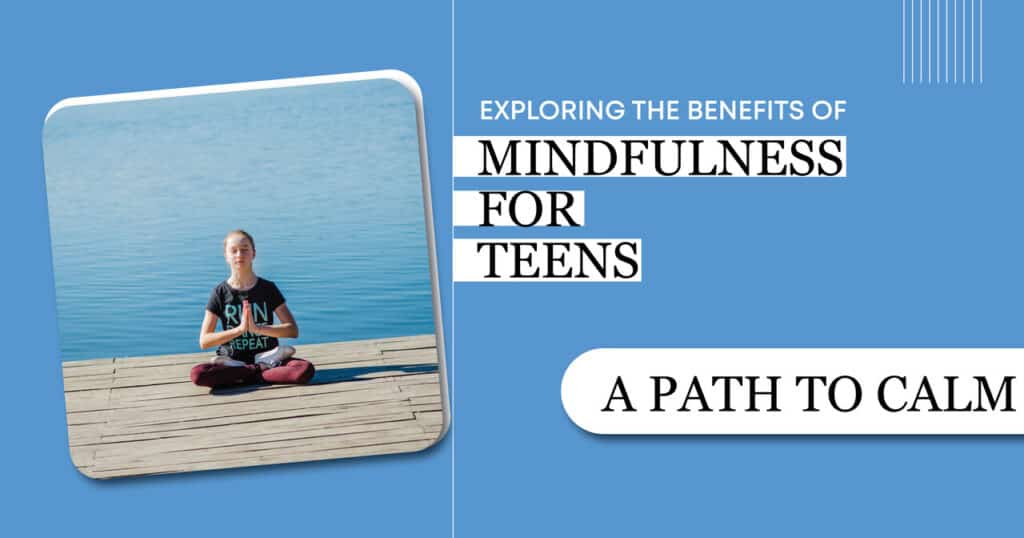Today’s teenagers are bearing an enormous burden: grades, social expectations, mental health stresses, and constant pressure from technology. No wonder that both parents and educators are acutely concerned with mental well-being. Managing stress, staying present, and regulating one’s emotions are crucial for teenagers in such a fast-paced world. Mindfulness for teens has been reported as one good tool to pay attention to.
Mindfulness is a game-changer for most teenagers, providing them with skills to navigate turbulent emotions and challenging environments. But what is mindfulness, and how could it help teens? Hearing “mindfulness” triggers images of a quiet forest or cushions in a meditation studio for most of us.
In this blog post, we explore the benefits of mindfulness for teenagers, discuss practical mindfulness activities for teens, and explore how mindfulness is deeply connected to teen mental health. By the end, you will understand why mindfulness for teenage anxiety is becoming so popular and how teens can easily incorporate simple techniques into their lives to help them thrive.
What Is Mindfulness?
Mindfulness is the art of living fully in the present, untainted by judgment and distraction. It is the practice of paying attention to thoughts, feelings, and sensations in the here and now. The idea of mindfulness is not about stopping thoughts and feelings but observing them with acceptance and awareness. This simple yet powerful practice helps one gain calm and clarity; hence, it is excellent as a tool for mindfulness in teens.
Mindfulness, in essence, encourages individuals to step away from their own busy lives to be aware of what is happening within themselves and the world around them. This is especially valuable for teenagers because it can help manage the stresses of adolescence-meaning peer pressure, schoolwork, and even challenges about personal identity.
Sometimes, the concept of mindfulness has been attributed to things meant to be done during meditation or yoga classes. However, it is very much a practice that can happen in ordinary everyday life experiences. Through mindfulness, teens would be able to regulate their emotions, reduce anxiety, and steer their perspectives toward healthier living.
The Growing Need for Mindfulness in Teenagers
Today, life has brought numerous challenges to today’s teenagers. According to the National Institute of Mental Health, nearly one in three adolescents suffer from an anxiety disorder. Yet it is school pressure, social media presence, and peer relationships that add that much pressure to a teenager’s life and create stress and emotional instability. In such an environment, mindfulness for teens is imperative now more than ever.
Adolescence is highly fluid, so transitioning from childhood into adulthood could be even more daunting. There has been an increased intertwining of mindfulness and teen mental health as youth look for ways to deal with their emotions. Pressures could cut across performance at school up to social circles, so, it takes a toll on their psychological well-being. Mindfulness allows them to take control of their psychological well-being by slowing down and looking inward.
There is growing evidence that mindfulness is an effective tool for helping to address these challenges. Teens can use it to cope with stress, better control their emotions, and bring awareness about the self. Mindfulness enhances the development of these skills and encourages resilience, which is central to emotional health and development during those formative years.
Key Benefits of Mindfulness for Teens
Teenagers live in a society that demands constant attention in school, social media, mural activities, or family commitments. Mindfulness for teens will give a young person an essential tool to reclaim control over one’s emotions and mind. Let us now talk about the key benefits that mindfulness brings to youth:
Stress Reduction
Teenagers are stressed primarily due to academic burdens, other scheduled activities, and socioeconomic pressures in a student’s life. Mindfulness for teenagers provides a simple tool that helps reduce stress. It has been proven that practicing mindfulness helps bring down levels of cortisol, the stress hormone, so teens will be at ease. Mindfulness enables teens to avoid anxious thoughts and worries by focusing on the present moment.
Emotional Regulation
The feeling stage is often experienced during adolescence, that is, among teens, both in terms of excitement and happiness as well as irritation and depression. Mindfulness practices better enable adolescents to control these feelings. Through mindfulness practice, the teenager can focus on their emotional responses without acting them out immediately. This way, one can govern his or her emotions healthily, which contributes to reducing impulsive behavior and better decision-making.
Improved Focus and Attention
Concentration is the key to academic success and development. Mindfulness teaches teenagers to concentrate by focusing on purpose rather than letting it be dragged about by everything in the surroundings. No longer distracted by stimuli outside the window, the mindful teenage observer attends more closely to the moment’s activity: study, conversation, or project development.
Self-Awareness and Self-Esteem
Adolescence is, in many ways, a period of discovery of oneself, and mindfulness helps students of this age group become more self-aware. It gives them an opportunity to understand their personal choices, worth, and value system and what motivates them. Self-acceptance and self-esteem are strongly developed when teenagers learn how to view their identity and realize their worth.
How Mindfulness Improves Teen Mental Health
Anxiety and depression are the most common mental health problems among teenagers. A study in the Journal of Adolescent Health contends that mindfulness-based interventions significantly reduce the symptoms of anxiety and depression among adolescents. That is one reason mindfulness and teen mental health are highly connected.
Teens who do mindfulness regularly report lower levels of emotional instability and not being overwhelmed by irrelevant thoughts. Mindfulness for teenage anxiety focuses directly on the stress and anxiety-provoking sources that lead to anxiety disorders. Teaching teens mindfulness to cope with all those feelings gives them a sense of being more grounded and calm even when things get rocky.
Mindfulness also tends to adopt a nonjudgmental view of feelings and thoughts. This way, the teenager is able to build a healthy relationship between inner experiences, not mentally labeling them as disease-carrying for other people or dysfunctional for others. Teenagers avoid just bottling up their feelings; rather, they feel free to experience and let go of unnecessary stress.
Practical Mindfulness Activities for Teens
However, putting mindfulness into a teenager’s life does not have to mean it needs to become complicated or time-consuming. There are quite a few mindfulness activities for teens that can easily fit into daily routines. Now, let’s talk about some of them:
- Breathing Exercises
Breathing exercises probably are the most accessible and effective forms of mindfulness activity. They can be done anywhere, and only for a couple of minutes.
One popular technique for teens is deep belly breathing: breathe in through your nose as deeply as possible, keep the breath inside for some seconds, and breathe out slowly through your mouth. This calms the nervous system and reduces feelings of anxiety or stress.
- Body Scan
A body scan is a mindfulness exercise in which a person creates awareness of different parts of the body and sensations or tensions. It’s an excellent technique for becoming conscious of the body and discovering physical feelings.
To do this exercise, teens must lie down or sit comfortably to start scanning from their toes to their heads.
- Guided Meditation
For those just beginning, guided meditation is an excellent place to start learning mindfulness practice. Loads of free apps and YouTube videos provide guided meditations for teens that walk them through relaxing visualizations or breathing exercises. Sessions usually run between 5 and 20 minutes so that even with the busiest of teen schedules, they can find a little time.
- Mindful Walking
Mindful movement is enacted through mindful walking. At any time during any walk, teens will attend to the sensations of walking and their manner of walking, becoming aware of contact with the ground beneath their feet, movement in their bodies, and openness to the field of vision. Practice brings them back to the present moment and a sense of serenity.
- Journaling
A beneficial mindfulness practice is journaling. Journaling forces the teen to introspect about their thoughts and feelings. Writing down your emotions and what you experience helps teens process difficult situations and reduce their anxiety levels as they gain insight into their mental states.
Writing down three things they’re grateful for is a good practice for the day as this shifts their focus onto better aspects of life.
Incorporating Mindfulness into Daily Routines
One of the best advantages of mindfulness is that it can be practiced anywhere, anytime. Teens can easily incorporate mindfulness into their usual activities without finding it a burden. Here are some tips for incorporating mindfulness into daily life:
- Mindful Morning Routine. Encourage your teenager to have a mindful morning routine simply by spending a few minutes in mindful breathing or body scanning before getting out of bed. This can provide an intent tone for the rest of the day.
- Mindful Eating. Teenagers can train their minds during meals by how delicious it is, how hard it is to chew, and how good it smells. Mindful eating can help improve digestion and add a thankful feeling for the nourishment received.
- Mindful Breaks. Scrolling through social media will not cut it; teens can take a mindful moment to stretch or breathe between classes or during their lunch break. These little moments all day can reduce stress and improve focus.
- Mindful Bedtime Routine. Nothing can be more soothing at bedtime than mindfulness exercises like deep breathing or meditation, which help to de-dramatize and relax the teenager into a good sleep.
Mindfulness practiced by including it in their daily routine will help the teens develop a calmer and clearer sense of the day at large.
Mindfulness Techniques for Managing Teenage Anxiety
Perhaps the most commonly experienced form of teenage anxiety is mental anxiety. It may be social anxiety, performance anxiety, or generalized anxiety, but certain techniques of teen mindfulness can help alleviate all of it. Here are some techniques teens can use to manage their anxiety:
- Grounding Exercises
Grounding exercises can help teens focus on something that brings them out of their anxious thoughts to stay in the moment.
It might be as simple as what they call the “5-4-3-2-1” exercise: focusing on five things they can see, four things they can touch, three things they can hear, two things they can smell, and one thing they can taste. Then their minds are brought back to a more concrete and less anxiety-causing state.
- Visualization
Visualization is an anxiety-controlling solid technique. Teens can be taught to imagine a calm, peaceful environment, like a beach or a forest. This activity engages the sense of imagination and seems alive. It’s highly effective in soothing panic and anxiety.
- Self-Compassion
They can be the worst critics, especially when it comes to anxiety. Mindfulness teaches teens how to be gentle and merciful toward themselves and how to receive such treatment. This teenager would not be ashamed of their anxiety but learn to accept them as normal.
Final Thoughts
Mindfulness is an invaluable resource for those young people who wish to be much more conscious, diminish stress levels, and find ways to deal with the turmoil of adolescence. Once again, mindfulness activities for teens, mindfulness for teenage anxiety, or simply practicing teen mindfulness techniques to enhance awareness and emotional non-overwhelm and inner peace.
The good news about mindfulness is that its effects on teens are profound. As more teens take up the practices, we can look forward to a generation of young people who will be better equipped to handle life’s ups and downs.
Mindfulness improves the health and well-being of teens, giving them skills that will help them throughout their lives. Whether you are a teen or a parent of a teen, it’s never too early to start practicing mindfulness and unlocking its many benefits.
FAQs
- What age should a teen start practicing mindfulness?
No age is too young for mindfulness practice, and mindfulness is very helpful in its effects on teens during adolescence. Teenagers undergo massive emotional and physical changes, and mindfulness can effectively aid them in navigating such challenges.
Parents and educators should encourage teens to be initiated into mindfulness practice at their comfortable age of needing constant and direct guidance. A range of 12–14 years would be a good time for introducing mindfulness practices.
- How does mindfulness for teenage anxiety help?
Mindfulness works for teen anxiety because it helps the teen become more aware of their anxious thoughts and feelings before responding to them.
Deep breathing, body scans, and grounding are a variety of mindfulness techniques that can help teens develop a sense of calm and control over their emotional responses that ease the intensity of an anxious state and call forth a more balanced and focused mindset.
- Can mindfulness improve academic performance in teens?
Yes! Mindfulness and mental health are closely linked, and mindset can also enhance learning effectiveness. Mindfulness practice in teens improves their attention, reduces distraction, and decreases examination and school project-induced stress.
Mindfulness exercises for focus enhancement in adolescents, such as mindful breathing or simple meditation, will help maximize cognitive ability and brain memory.
- Are there any teen mindfulness activities that can be done in a group?
Absolutely! Group mindfulness activities can benefit teens who feel more comfortable practicing with others.
Some mindfulness activities that thrive in groups include guided group meditations, mindful listening exercises, and mindful movement, think yoga or walking. Group activities promote a sense of connection and help teens learn from one another’s experiences.
- How long does it take teens to notice mindfulness’s benefits?
The timeline varies by individual, but many teens will report more calm and clarity of thought after just a few weeks of steady mindfulness practice. If a teen is more mindful during the daily routine, the longer-term effects of being able to cope with emotional regulation, stress, and overall wellness will come sooner.
Remember that each outcome is unique for each student and that mindfulness is practiced frequently.




